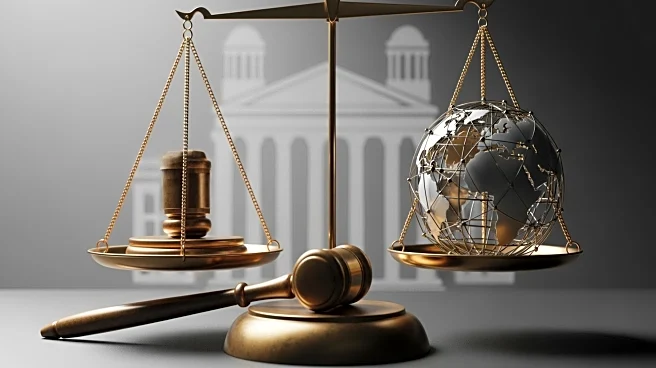What's Happening?
The Supreme Court is currently deliberating on whether President Trump can utilize the International Emergency Economic Powers Act to impose new tariffs under a declared national emergency. This decision
is pivotal as it could determine the extent of presidential powers in economic matters. The case has attracted significant attention due to its potential impact on U.S. trade policy and the economy. The administration argues that the tariffs are necessary to protect national interests, while opponents claim it oversteps executive authority. The outcome of this ruling could have far-reaching implications for the President's ability to manage economic policy unilaterally.
Why It's Important?
The Supreme Court's decision on this matter is crucial as it will set a precedent for the scope of presidential powers in economic emergencies. If the Court rules in favor of President Trump, it could expand executive authority, allowing future presidents to impose tariffs without congressional approval. This could lead to significant shifts in U.S. trade policy, affecting industries reliant on international trade. Conversely, a ruling against the President could limit executive power, reinforcing the need for legislative oversight in economic decisions. Stakeholders such as businesses, trade partners, and policymakers are closely monitoring the situation due to its potential impact on the economy and international relations.
What's Next?
Should the Supreme Court rule against President Trump, the administration may need to explore alternative strategies to implement its trade policies. This could involve seeking congressional approval for tariffs or negotiating with trade partners to address national security concerns. Additionally, the ruling could prompt legislative efforts to clarify the limits of presidential powers under the International Emergency Economic Powers Act. Political leaders and industry groups are likely to react strongly to the decision, influencing future debates on executive authority and trade policy.
Beyond the Headlines
The case highlights broader issues regarding the balance of power between the executive and legislative branches in the U.S. government. It raises questions about the use of national emergencies to justify policy changes and the potential for abuse of such powers. The decision could also influence public perception of presidential authority and its impact on democratic processes. Legal experts and civil society groups may use the ruling to advocate for reforms to ensure checks and balances in government decision-making.









